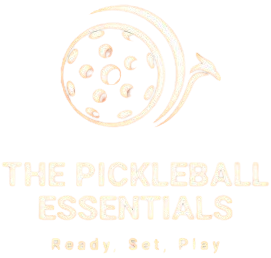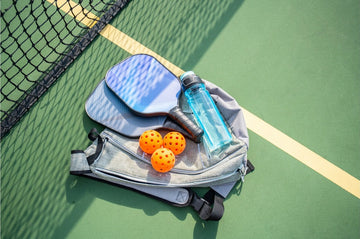Mental Health and Wellness for Pickleball Players: A Holistic Approach to Enjoying the Game
by Linda Conrad on Aug 27, 2024

Introduction
Pickleball is not just a physical game; it also offers numerous mental health benefits. Engaging in regular physical activity, socializing with others, and achieving personal goals can significantly enhance mental well-being. However, like any sport, it also presents mental challenges such as competition stress, frustration over performance, and the psychological impact of injuries. This guide explores the importance of mental health and wellness in pickleball, provides strategies for managing stress, and highlights the mental benefits of playing pickleball. By focusing on both mental and physical health, players can enjoy the game more fully and lead a balanced, fulfilling life.
The Importance of Mental Health in Pickleball
- Enhancing Enjoyment and Longevity in the Sport:
- Playing pickleball is a fun and social activity, which can boost mood and provide a sense of belonging. Focusing on mental health ensures that players enjoy the game, avoid burnout, and maintain a positive attitude, making it more likely they will continue playing long-term.
- Statistics: A study published in the International Journal of Environmental Research and Public Health found that social sports, like pickleball, significantly improve quality of life, happiness, and social interaction, especially in older adults.
- Reducing Stress and Anxiety:
- Physical activity releases endorphins, which are natural mood lifters. Engaging in regular pickleball play can help reduce stress and anxiety, providing a healthy outlet for managing daily pressures and emotional challenges.
- Statistics: The Anxiety and Depression Association of America states that regular exercise can reduce anxiety by 20-30% and improve mental clarity and relaxation.
- Improving Cognitive Function:
- Pickleball involves quick thinking, strategy, and decision-making, which can help keep the mind sharp. Mental stimulation through sports is associated with improved cognitive function and a reduced risk of cognitive decline.
- Statistics: Research from the Alzheimer’s Association indicates that regular physical activity can reduce the risk of cognitive decline by up to 50%, highlighting the importance of keeping the brain active.
- Building Confidence and Self-Esteem:
- Achieving goals, learning new skills, and improving performance in pickleball can boost confidence and self-esteem. This positive self-perception extends beyond the court, influencing overall life satisfaction and well-being.
- Statistics: The American Psychological Association notes that physical activity can improve self-esteem and confidence, particularly when it involves mastering new skills or overcoming challenges.
Strategies for Managing Stress and Enhancing Mental Health in Pickleball
- Setting Realistic Goals:
- Goal setting is a powerful tool for motivation and self-improvement. By setting realistic and achievable goals, players can track progress, celebrate small victories, and stay motivated. Goals should be specific, measurable, attainable, relevant, and time-bound (SMART).
- Examples:
- Improving serve accuracy by practicing for 20 minutes three times a week.
- Joining a local pickleball league to play competitively and meet new people.
- Learning a new shot or technique within a set timeframe.
- Practicing Mindfulness and Focus:
- Mindfulness involves being fully present in the moment and accepting thoughts and feelings without judgment. Practicing mindfulness can help players stay focused during games, manage anxiety, and improve overall mental clarity.
- Techniques:
- Breathing Exercises: Deep breathing helps calm the mind and reduce stress. Practice deep breathing before and during games to maintain composure.
- Visualization: Visualizing successful shots or strategies can build confidence and reduce anxiety. Spend a few minutes before playing visualizing positive outcomes.
- Balancing Competition and Fun:
- While competition is a natural part of sports, it's important to balance it with fun and enjoyment. Players should focus on personal improvement and having a good time, rather than solely on winning.
- Tips:
- Play with friends who have a similar skill level and enjoy the social aspect of the game.
- Participate in recreational games or friendly matches to reduce pressure and keep the game enjoyable.
- Remember that mistakes are part of the learning process and an opportunity for growth.
- Social Support and Community Involvement:
- Social connections are a key component of mental well-being. Joining a pickleball community or club provides a sense of belonging and offers opportunities for social interaction, support, and friendship.
- Activities:
- Join local pickleball clubs or leagues to meet new people and participate in social events.
- Engage in group practices or clinics to learn and improve skills while connecting with others.
- Organize social gatherings or events with fellow players to build camaraderie and support.
- Managing Performance Anxiety:
- Performance anxiety can affect players at all levels, leading to nervousness and decreased performance. Developing strategies to manage anxiety can help players stay calm and focused.
- Tips:
- Focus on the process, not the outcome. Concentrate on executing each shot or movement correctly rather than worrying about the final score.
- Develop a pre-game routine that includes relaxation techniques, such as listening to music or practicing breathing exercises.
- Practice regularly to build confidence and familiarity with the game, reducing anxiety during competitive play.
Mental Health Benefits of Playing Pickleball
- Social Interaction and Community Building:
- Pickleball is a social sport, often played in pairs or groups. Engaging in regular play provides opportunities to meet new people, build friendships, and feel part of a community. Social interactions can reduce feelings of loneliness and improve overall well-being.
- Statistics: The Centers for Disease Control and Prevention (CDC) notes that social isolation is linked to higher rates of mental health issues. Engaging in social activities, like pickleball, can help reduce these risks.
- Stress Relief and Relaxation:
- Physical activity helps release tension and reduce stress hormones like cortisol. Playing pickleball provides a fun and engaging way to relieve stress and promote relaxation.
- Statistics: The Mayo Clinic reports that regular physical activity can reduce stress and improve mood by releasing endorphins, the body’s natural stress relievers.
- Improved Sleep Quality:
- Exercise can improve sleep quality by helping to regulate the sleep-wake cycle, reduce insomnia, and promote deeper sleep. Getting enough sleep is essential for mental health, cognitive function, and overall well-being.
- Statistics: The Sleep Foundation highlights that regular exercise can improve sleep quality by 65%, helping individuals fall asleep faster and enjoy deeper, more restful sleep.
- Cognitive Enhancement:
- Engaging in sports like pickleball requires quick thinking, strategy, and decision-making, which can help keep the mind sharp. Regular mental stimulation through physical activity can improve memory, attention, and cognitive function.
- Statistics: The Harvard Medical School states that regular physical activity can boost brain function and cognitive health, reducing the risk of cognitive decline by up to 30%.
Tips for Maintaining Mental Health and Wellness
- Stay Active:
- Incorporate regular physical activity into your routine to boost mood, reduce stress, and improve mental clarity. Playing pickleball, walking, cycling, or engaging in other forms of exercise can help maintain mental and physical health.
- Practice Self-Care:
- Prioritize self-care activities that promote relaxation and well-being. This may include reading, meditating, spending time in nature, or pursuing hobbies and interests outside of pickleball.
- Seek Support:
- If you’re struggling with mental health issues, don’t hesitate to seek support from friends, family, or mental health professionals. Talking about your feelings and concerns can provide relief and help you find solutions.
- Balance Your Schedule:
- Find a balance between pickleball, work, and personal life. Avoid overcommitting or placing too much pressure on yourself to perform. Remember that taking breaks and resting is essential for overall well-being.
Conclusion
Mental health and wellness are crucial components of a fulfilling pickleball experience. By focusing on setting realistic goals, practicing mindfulness, balancing competition with fun, and building social connections, players can enhance their mental well-being and enjoy the game to its fullest. Remember, mental health is just as important as physical health, and taking care of your mind will help you stay happy, healthy, and active both on and off the court.
For more health and wellness tips related to pickleball, visit The Pickleball Essentials Health and Wellness Page.



